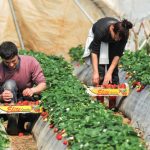Australia – Where Backpackers are Exploited and Harassed

Australia has long been a country that young people aspire to travel – the golden beaches, surf culture, and the never-ending sunshine make it attractive to backpackers in particular.
And the Australian Government has made it relatively easy for young people to come for an extended period. But the program, which sees thousands of foreigners travel to rural locations to work on farms to stay an extra year in Australia, has become increasingly controversial after a number of fatal accidents in recent years.
The rural work requirement
Subclass 462 visa holders who undertake three months (88 days) work during their stay in either the agriculture or tourism and hospitality industries within northern Australia, become eligible to apply for a second Work and Holiday visa.
The visa requires backpackers to work in laborious jobs such as fruit picking and packing, trimming vines, building, construction, painting and working as farm hands. The idea is that farmers get the help they need at a cheap price, and backpackers meet their visa requirements to keep on travelling.
Backpackers are vulnerable
Of course, most travellers come under no significant harm under the arrangements.
Many backpackers report loving Australia, and that working on a farm added to their experience.
However, a number of foreign backpackers have died here in recent time, and as investigators look into their deaths, signs of a dark and seedy culture are emerging – with reports of sexual assaults, sexual harassment, substandard living conditions, breaches of workplace safety laws and financial exploitation.
Last year, 27-year old Belgian backpacker Olivier Caramin died in Ayr, Northern Queensland. Oliver had been here for just a week and passed away in hospital as a result of suspected complications relating to heatstroke. Before succumbing to the heat in the blazing North Queensland sun, Oliver reported to other workers that he could not go on, but that he was afraid to stop because he had already incurred the wrath of his boss earlier that day for working too slowly.
And on Boxing Day last year, German backpacker Jennifer Kohl, also 27, died when she was crushed by a ride-on mower which toppled while being driven on a hill at an Avocado farm. Workplace Health & Safety were called in to investigate that incident, and a report is being prepared for the Coroner.
Workplace standards
Reports of underpayment, high picking quotas, over-crowding in rundown accommodation, and sexual harassment are common.
The Australian Workers’ Union, which covers fruit pickers and farm labourers, says back-packers often receive little training. As a result, there are risks of breaches in workplace safety and resulting injuries, as well as an opportunity for exploitation.
Backpackers are often at the mercy of farmers – as they often live in isolated places on the land of their employers. And in these places, there may be little access to workplace support systems or even policing. Many report putting up with mistreatment in order to get their papers signed.
Katherine Stoner is currently producing a documentary about her experience as an 18-year old backpacker in rural Australia. She reports that some of the farmers were rude and sexist, and that sexual harassment was accepted as the norm.
She reports that one farmer suggested that she and her friend, who was also 18, might like to pick peaches naked because it was a hot day.
Sexual harassment, exploitation and underpayment
Such conduct sits alongside other reports of sexual misconduct, with allegations of farmers offering to sign the paperwork of young women in exchange for sex. Other backpackers have reported being offered ‘easier’ jobs for sexual favours.
An online survey of 4,322 temporary migrants – which included backpackers, students and people on temporary work visas – found that almost half reported being paid $15 an hour or less, when the minimum wage at the time was $21.15.
Under Australia’s workplace laws, holiday makers, including backpackers and students who are allowed to undertake some work, are entitled to the same basic rights and protections as other employed Australians.
But this doesn’t seem to be the experience of travellers.
Fair Work Ombudsman acknowledges there are ‘unscrupulous operators’
In 2017, two British backpackers who were paid low, flat rates while working at a crocodile farm in far north Queensland were back-paid more than $13,000, following an investigation by the Fair Work Ombudsman (FWO).
The pair were on 417 working holiday visas, and worked as casual at the farm to complete the 88 days of regional work required to stay in Australia for a second-year.
At the time, the FWO warned employers that it would not hesitate to take appropriate action to enforce the law where employers deliberately took advantage of vulnerable workers.
Putting up with it
While employers who engage in criminal conduct or otherwise breach workplace rules should face the full force of the law, many young people don’t feel brave enough to stand up, or aren’t necessarily aware of what basic rights they have.
When it conducted an investigation into the experiences of 417 working holiday visa-holders in regional Australia, the FWO found that the 88 day rural working requirement was ‘unintentionally creat[ed] an environment where some unscrupulous operators are exploiting overseas workers, who are often reluctant to complain’.
The agency has since released its ‘Record My Hours’ smartphone app which is aimed at helping workers to keep records of the hours they work.
It says overseas workers can also anonymously report workplace issues in their own language – the function is available in 16 languages other than English.








